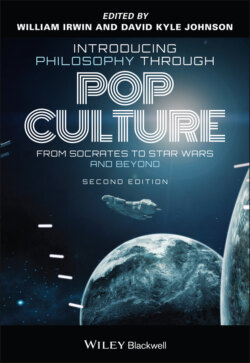Читать книгу Introducing Philosophy Through Pop Culture - Группа авторов - Страница 48
Summary
ОглавлениеIn The Matrix Trilogy, humanity is enslaved, trapped inside a virtual reality called “The Matrix.” Since the Matrix is indistinguishable from the real world, how can we know that the movie is fiction? How can we know that we are not trapped inside the Matrix ourselves? This chapter uses The Matrix to raise the skeptical problem – how can we have knowledge at all, if we cannot even know that the world exists? And does the modern philosopher Descartes present a working solution to the skeptical problem?
This is your last chance. After this there is no turning back.
– Morpheus† 1
Before meeting Morpheus, Thomas Anderson was just a regular guy at a regular job trying to make ends meet. Sure, he led a sort of double life, spending much of his time behind a computer keyboard, hacking under the screen name “Neo,” but even then he was not so different from the rest of us. Neo took this world to be the real world – just as we do. But as it turned out, he was wrong about so much. He thought that he was living at the end of the twentieth century, that he had hair, that the sun was shining, that he knew his parents, and that all of his acquaintances were actually human. Yet none of this was true. To put it bluntly, Neo had no idea what the world was really like. Neo's predicament illustrates the need to “question reality” – which is arguably the main philosophical message of the first Matrix film. The Matrix urged us not to take the world at face value, and it showed us how deceptive appearances can be. However, most people feel quite confident that we are not in the Matrix. They feel certain that our most basic beliefs are not mistaken. But what justifies this sense of confidence? After all, Neo's situation was, on the face of it, no different than ours. His world seemed just like our world. Should he have known that he was living in a dream? Despite the fact that he is sometimes chided about his intelligence by the Oracle (“Not too bright though”) and by Agent Smith (“I see that you are still using all the muscles but the one that matters most”), there were no tell‐tale signs that Neo should have noticed in order to realize that his world was illusory. Without the help of Morpheus, I expect that he would never have known.
By taking the red pill, Neo encountered an age‐old philosophical problem: How do you know what is real? Or, worse yet: Can you know what is real? This is called the problem of skepticism. A skeptic is a person who believes that we can never know what the world is really like because there is always the possibility that we could be radically mistaken about most of our beliefs, just as Neo was. Most people are not plagued by such skeptical doubts. Neo certainly wasn't. Prior to that red pill, he would never have supposed that his whole life was an illusion. Even when he saw it with his own eyes he had trouble believing it, and ended up puking his breakfast onto the floor. Nevertheless it is fair to say that for years Neo had been restless – plagued by a vague and amorphous feeling that something was not quite right with the world. Maybe you have had that feeling too. The question is: How seriously should you take it?
